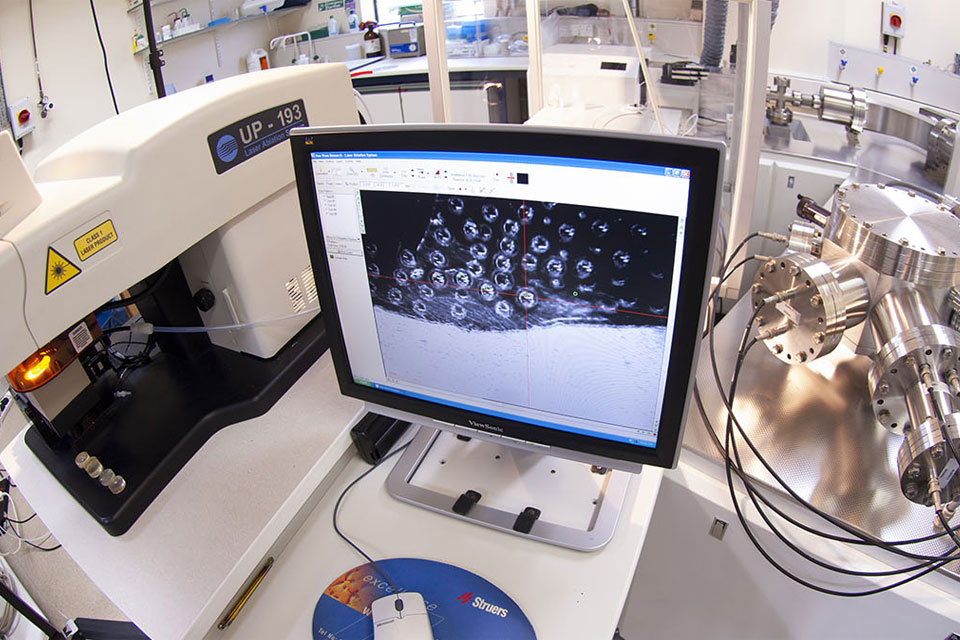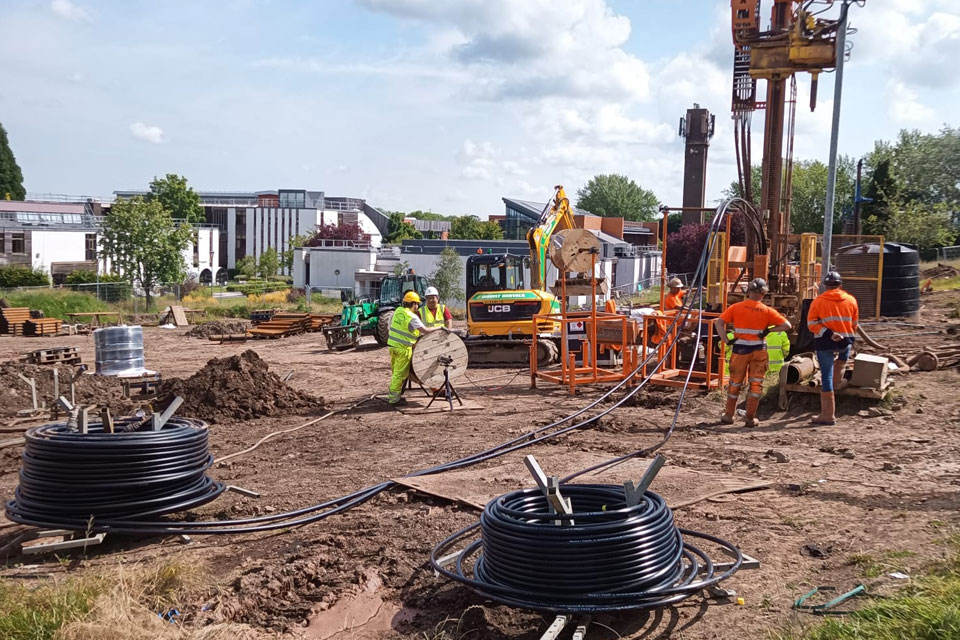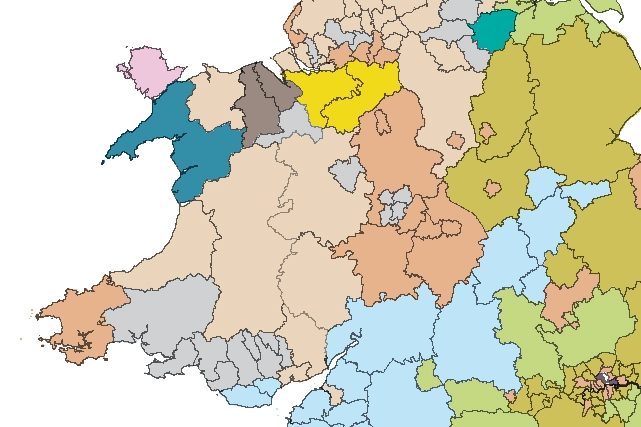New for 2023: summer placements scheme at BGS
BGS is excited to be trialling a six-week placement scheme for students in partnership with the School of Geography, University of Nottingham.
06/06/2023 By BGS Press
BGS is excited to be trialling a placement scheme during the summer of 2023 for students* who are about to enter university, or who are currently studying as an undergraduate student in years 1 or 2 of their geography, earth science or environmental sciences degree. We can take up to four students who will have the opportunity to:
- learn about BGS
- learn and experience the diversity of job roles within the geosciences
- work on a number of collaborative geoscience projects with an equality, diversity and inclusion and public engagement component
BGS welcome applications from students who meet the criteria outlined. We particularly welcome applications from under-represented groups in the geographical, earth and environmental sciences (GEES), for example individuals from ethnic minority backgrounds, women and people with disabilities (visible and hidden).
*Students applying for this scheme must be 18 or over by 24 July 2023.
Criteria
- Completed sixth form or in years 1 or 2 of an undergraduate GEES degree
- Available for six weeks between 24 July and 8 September 2023
- Over 18 by 24 July 2023
- Applied by the deadline 16:00 on Friday 23 June 2023
- Submit a CV and a covering letter that addresses the three main questions (how to apply)
If your experience looks a little different from these criteria and you think you can bring value to the role, we would love to learn more about you.
What does the scheme involve?
This scheme will be delivered by BGS in partnership with the School of Geography, University of Nottingham. The placement is designed to run for six weeks. During this time, you will:
- be introduced to the diverse range of job roles that are related to geoscience and the work of BGS
- work independently and collaboratively on a small number of projects that crossover with equality, diversity and inclusion and public engagement
- gain work experience in the geosciences
- gain practical experience in geoscience techniques, including a small amount of local field work and laboratory experience
- gain skills in CV writing and interview techniques
- meet many different people from BGS and the School of Geography
What would a typical day look like?
Your working day will be six hours. You will be based at the BGS headquarters in Keyworth (Nottingham) for four out of the five days in any week. When at BGS, a typical day could involve a two-hour (or more) interactive session with a member of BGS staff to learn about their work and, where possible, to experience and try it out for yourself! You will then spend four hours of the day working on collaborative or independent projects. We have some projects in mind, but we are also open to your ideas and can support you in developing a project during this time.
Where are the placements located?
The placements will be hosted at the BGS headquarters in Keyworth, Nottingham (NG12 5GG). You will spend one day a week based at the School of Geography, University of Nottingham (NG7 2RD).
BGS values the ability to work flexibly and hybrid working may be an option for small components of this role. Given the nature of the placement, there are several components that will need to be undertaken in person and cannot be completed remotely.
Is this a paid placement?
Yes. The four places available for the summer placements are paid. You will be contracted to work 30 hours per week (09:00 to 15:30)**. The salary for these positions will be £20 049 pro rata. For this placement scheme, this roughly equates to an hourly rate of £10.42.
**The hours are inclusive of a lunch break (total 32.5 hours per week).
How to apply
If you would like to apply for this scheme you will need to send a CV and covering letter (maximum one page) to the EID team (EDITeam@bgs.ac.uk). Please ensure all files names include your surname (for example, Mills_CV, Mills_Letter).
Your covering letter should include:
- information about you and your experience so far
- where you see your degree taking you
- why you are interested in a summer placement at BGS
The closing date for applications is no later than 16:00 on Friday 23 June 2023. Applicants will be notified of the outcome no later than Friday 30 June 2023.
We will not be interviewing for these positions. If the scheme is over-subscribed, all eligible applications (those that meet the criteria outlined above) will be pooled and places allocated using a randomised approach.
Further information
If you have any questions about this scheme, please contact Dr Keely Mills, the scheme coordinator.
Latest news

Call for new members and Chair to join the NERC facilities steering committees
25/02/2026
New members are needed to join the committees over the next four years.

Your views wanted – developing a ‘Geothermal energy subsurface data portfolio’
24/02/2026
BGS is aiming to support the growth of the sector by providing the best-available, location-specific geothermal and ground source heat information as an accessible product or service.

Map of BGS BritPits showing the distribution of worked mineral commodities across the country
18/02/2026
BGS’s data scientists have generated a summary map of the most commonly extracted mineral commodities by local authority area, demonstrating the diverse nature of British mineral resources.

Funding awarded to map the stocks and flows of technology metals in everyday electronic devices
12/02/2026
A new BGS project has been awarded Circular Electricals funding from Material Focus to investigate the use of technology metals in everyday electrical items.

New UK/Chile partnership prioritises sustainable practices around critical raw materials
09/02/2026
BGS and Chile’s Servicio Nacional de Geología y Minería have signed a bilateral scientific partnership to support research into critical raw materials and sustainable practices.

Extensive freshened water confirmed beneath the ocean floor off the coast of New England for the first time
09/02/2026
BGS is part of the international team that has discovered the first detailed evidence of long-suspected, hidden, freshwater aquifers.

Funding secured to help mitigate ground risk in UK construction sector
05/02/2026
The BGS Common Ground project has been awarded new funding to help unlock the value of ground investigation data.

Can sandstones under the North Sea unlock the UK’s carbon storage potential?
02/02/2026
For the UK to reach its ambitious target of storing 170 million tonnes of carbon dioxide per year by 2050, it will need to look beyond the current well-studied geographical areas.

Quaternary UK offshore data digitised for the first time
21/01/2026
The offshore wind industry will be boosted by the digitisation of a dataset showing the Quaternary geology at the seabed and the UK’s shallow subsurface.

Suite of ten new soil reference materials released
02/01/2026
BGS has a longstanding track record of producing high-quality reference materials and has released ten new soil reference materials.

Perth and Kinross tops the UK’s earthquake activity charts for 2025
29/12/2025
Seismologists at BGS have published data on the number of seismic events over the past 12 months with over 300 earthquakes recorded.

BGS awarded funding to support Malaysia’s climate resilience plan
17/12/2025
The project, funded by the Foreign, Commonwealth & Development Office, will focus on minimising economic and social impacts from rainfall-induced landslides.

